Vol 1 No. 34 TROPIC LIGHTNING NEWS October 14, 1966
Index
[The 1966 Vietnam issues of Tropic Lightning News were published in Saigon,
and are of lower quality than later years that were printed in Japan. Over
the years the photographs and text have faded and it has been difficult to
reproduce them. Even when the photos are unclear, I have been included
them to give a sense of the activities in the Division.]
Village Chief Dies For Government
By Sp5 Bill Becker
For most of the people of Tan Phu Trung, a village located about four miles
outside the 25th Infantry Division’s base camp, September 28 was a happy day.
It was the annual mid-autumn holiday, a kind of Vietnamese children’s
Christmas, and the Americans from Cu Chi were coming to hand out presents and
candy.
But the chief of Ap Moi II, one of the village’s hamlets, looked forward to
the day with a kind of morbid anticipation. Viet Cong in the area had sent him
a note - he was helping the Americans too much and would be killed if he
attended the festival.
As soon as the chief read the note, he knew what he would do. He would
forget it. If necessary, he would die as he had lived - working for his
government.
The holiday came and the chief attended the hamlet’s celebration, shaking
hands and joking with the Americans and the other government officials. Hands
reached for gifts, hands received gifts, smiles spread on faces and a feeling of
warmth and well-being filled Ap Moi II.
When the party ended, the chief went home. As darkness fell, 10 Viet Cong
came to his house, dragged him from his wife’s hysteria and killed him.
The people were nervous as they went about their work the next day. Now they
had lost their leader. Americans during the day and Viet Cong at night.
They needed an indication.
That night, the Viet Cong came back. The people were flushed from their
houses and herded together. For two hours the VC told them that any of the
area’s officials who continued to help the Americans would be killed. When the
VC finished their threats, the people were sent back home.
Morning came to Ap Moi II again and with it came seven local popular force
troops supported by 10 American soldiers. The District Police Chief, two “Chieu
Hois” and the American captain who had helped pass out candy at the mid-autumn
celebration, Capt. Archie L. Dowdell, Civil Affairs officer for the 1st Bn. (Mech),
5th Inf., led their soldiers to a house.
The people watched. They knew the house and they knew the woman the soldiers
brought back out - she had been around the day before telling everyone to stay
away from the village officials or the Viet Cong would kill them.
The soldiers moved to another house. They brought out the man who had gone
to the chief’s widow and delivered a note telling her that the Viet Cong would
be back to explain why they had killed her husband.
The people watched the soldiers work. They moved into position quickly and
entered the houses confidently. The American captain was friendly. He talked
to the people through his translator and smiled at the children. The Police
Chief was business-like and asked quick, pointed questions. None of them seemed
too afraid of the Viet Cong.
The people were told that a new hamlet chief had been appointed and would
take his post within the next few days. In spite of Viet Cong threats, local
officials carry out their duties without flinching - just as their old chief had
gone to the party and laughed, knowing that the Viet Cong intended to kill him
for it.
The two suspects were loaded on a truck with the popular forces and taken
away. The Police Chief and American captain stayed for a while and talked to
the people.
When they left, the people of Ap Moi II knew that they would be back soon
with the information they needed to avenge the hamlet chief’s death.
| OCS
|
| Reel Riot Mechanics of the 725th Maint. Bn., carrying wrenches, screwdrivers and other small arms, stormed after their movie projectionist when Goldfinger fizzled out just before the love scenes. To see how the projectionist and James Bond fared, page 3. |
4/9th Manchus Score Big in Long An
14 Viet Cong Die; Huge Cache Found
By Sp5 Wayne Brendt
Striking hard and fast into an enemy base area, platoons from Co. C, 4th Bn.,
9th Inf., “Manchus” recently scored their first major success in Long An
Province by killing 14 Viet Cong and uncovering a large arms cache.
Included in the cache, the biggest catch for the 1st Brigade since its
arrival to Vietnam, were two 60mm mortars, complete with base plates, bipods and
sights.
Long An Province is 18 miles southwest of Saigon.
Sgt. Charles D. Kelly of Hamilton, Ohio, team leader for the 3rd squad, 3rd
platoon, was on the first lift into the hotly contested area. He said sniper
and automatic weapons fire was extremely heavy even before the ships touched
down.
“We heard a funny noise and the ship began to vibrate. The chopper hit a
little harder than normal and out we went,” he added.
Sgt. Kelly said that as soon as their helicopter was out of action, another
came right in alongside to evacuate the crew of the downed craft while the 3rd
squad performed security.
“We didn’t receive much fire where we were but there must have been Cong in
the bushes behind us as that was where the air strike went in. We could hear
heavy fire and M-79 rounds going off in the distance about 300 yards across the
paddies.”
Smack in the middle of the distant fire fight, 2nd Lt. Frank E. Moody, 1st
Platoon leader from Chicago, Ill., and Sgt. Samuel M. Cross from Bradley, Ark.,
the squad leader for 3rd squad, 1st Platoon, headed toward their objective for
the day.
Through intelligence channels, Lt. Moody’s group had learned of VC weapons
caches and they wanted them. The 27 men waded across the flooded rice paddies
to a nearby collection of huts.
“There were three main caches and one cache had three parts,” said Lt.
Moody. He added, “The weapons and ammunition were packed in a type of poncho
with plenty of oil on them. Most of the items we picked up were in one area
around a house.”
Sgt. Cross told about the action that took place around the group as they
searched for the enemy supply dumps. “We drew sniper fire and automatic weapons
fire until the gunships came in,” he said.
The NCO continued, “As we were moving around the huts and paddies I saw a
group of about 14 VC run up from the wood line. My men opened up with small
arms and machine gun fire and M-79 grenades.
Besides the mortar equipment, the cache included an automatic rifle, five
carbines, two submachine guns, 32 60mm mortar rounds, eight rifle grenades, four
anti-tank mines, five trip flares, a homemade mine, two rolls of electrical
detonating wire, 1 demolition kit with 25 blasting caps and a V.C. turtle mine.
In addition to this haul, Co. C uncovered more than 3000 rounds of small arms
ammunition, six Chicom claymore mines, 50 hand grenades, 15 81mm mortar rounds,
eight turtle shell mines and three anti-tank mines.
3rd Bde. Gets New Cmdr.
Col. James G. Shanahan of Syracuse, N.Y., has become the new deputy commander
of 3rd Brigade Task Force at Pleiku.
He replaces Col. Everette A. Stoutner, the new Assistant Chief of Staff, G-3,
II Field Force, Vietnam.
Col. Shanahan previously served with the “Tropic Lightning” Division from
1944 to 1947. During that time, the colonel was assigned to the G-2
(Intelligence and Security) Section of the 35th Inf. Regt.
During the Korean conflict, Col. Shanahan served with the 38th Inf. Regt. and
participated in the Korea Summer-Fall 1953 Campaign.
After his overseas tour, the colonel successfully completed courses at the
Command and General Staff College and National War College.
The 46-year-old colonel is the recipient of the Silver Star, the Bronze Star
Medal with one Oak Leaf Cluster, the Purple Heart, and the Combat Infantryman’s
Badge with Star.
 |
| SUCCESS - Tired but happy, the men of Co. C, 4th Bn., 9th Inf., gather around VC arms and ammunition captured during Operation “Lanikai.” (Photo by Vernon D. Shibla) |
50,000 Persons
Milestone for ‘Helping Hand’
“Helping Hand,” the division’s own goodwill civic action program, handed a
toy to its 50,000th recipient near Cu Chi recently in the hamlet of Tan Thoi.
The recipient, a three-year-old orphan girl named Gai, was presented the toy
by Capt. Lester T. Ikeda, Intelligence Officer of the 1st Bn., 8th Arty.,
marking the milestone in the 10-month-old program.
Conceived by the division’s commanding general, Maj. Gen. Fred C. Weyand,
“Helping Hand” began last January when the division began to move to Vietnam.
Along with ammunition, rations and personal belongings, the “Tropic
Lightning” soldiers moved tons of clothes, toys, books, tools and sanitation
articles to Vietnam and began distributing them to needy families.
To date, “Helping Hand” has passed out 344.8 tons of articles to orphans,
school children and families of wounded and killed Republic of Vietnam soldiers.
All of the articles have been contributed by people of Hawaii, the division’s
old home, and the continental United States.
In addition, rice captured by division troops is distributed to the
Vietnamese through the “Helping Hand” Program.
All of the food and articles is passed to the Vietnamese through unit civil
affairs sections.
Breakdown
• Rice..................91 tons
• Clothes..............102 tons
• Can Goods.............25 tons
• Building Materials....35 tons
• Wheat................100 lbs
• Misc..................94 tons
Page 2 TROPIC LIGHTNING NEWS October 14, 1966
Decorated
| SILVER STAR MEDAL | |
|
Capt. Lawrence M. Grant Jr., Co. C. 2nd Bn., 14th Inf. 1st Lt. Ronald E. Ray, Co. A, 2nd Bn., 35th Inf. 1st Lt. Poter H. Schnizer, HHC, 1st Bn., 27th Inf. 1st Sgt. Edward L. Fulghum, Co. A, 2nd Bn., 27th Inf. |
PSgt. Troy J. Woody. Co. C, 2nd Bn., 14th Inf. SSgt. Eugene M. Brown, Co. A, 1st Bn., 27th Inf. Sgt. Ralph M. Graff, Co. C, 2nd Bn., 14th Inf. |
| DISTINGUISHED FLYING CROSS |
|
|
Maj. Jesse M. Burch Jr., Co. A, 25th Avn. Bn. Maj. Cletus A. Hardin, Co. A, 25th Avn. Bn. Capt. Howard D. Deane, Co. A, 25th Avn. Bn. |
Sp5 William A. Easterling, Co. A, 25th Avn. Bn. Sp5 Vernon H. Woods, Co. B, 25th Avn. Bn. Sp4 John A. Rhodes, Co. B, 25th Avn. Bn. |
| BRONZE STAR MEDAL (VALOR) |
|
|
Capt. Jack P. Baldwins, HHC, 1st Bn., 35th Inf. Capt. Leonard C. Gregor, Co. D, 65th Engr. Bn. Lt. John R. Clark, Co. D, 65th Engr. Bn. Lt. Charles Markman, Co. B, 1st Bn., 69th Armor Lt. Lorraine Matthews, HHC, 1st Bn., 14th Inf. Lt. Kim H. Olmstead, Trp. C, 3rd Sqdn., 4th Cav. Lt. Robert Selkis, Co. B, 2nd Bn., 35th Inf. SSgt. Oliver Anderson, Co. B, 2nd Bn., 35th Inf. SSgt. Frank Maynard, Co. A, 2nd Bn., 35th Inf, SSgt. Patrick Weitzel, Co. B, 1st Bn., 69th Armor SSgt. Earsel Wiley, HHC, 2nd Bn., 35th Inf. Sgt. Earnest T. Aaron, Co. B, 1st Bn, 69th Armor |
Sgt. Herman Cull, Co. A, 2nd Bn., 35th Inf. Sgt. Sanford Gaboriault, Co. B, 1st Bn., 69th Armor Sgt. Harry Graf, Co. B, 2nd Bn., 35th Inf. Sp4 Benjamin Berryman, HHC, 2nd Bn., 35th Inf. Sp4 Willie Francis, Co. A, 2nd Bn., 35th Inf. (Posthumously) Sp4 Charles London, HHC, 1st Bn., 69th Armor Sp4 Richard Matthews, HHC, 1st Bn., 14th Inf. Sp4 Charles Moore, Trp. C, 3rd Sqdn., 4th Cav. Sp4 Gary Powers, HHC, 2nd Bn., 35th Inf. PFC Raymond Knight, HHC, 2nd Bn., 35th Inf. PFC Charles Simmons, HHC, 2nd Bn., 35th Inf. PFC Carl Smith, HHC, 2nd Bn., 35th Inf. |
| PURPLE HEART |
|
|
Sp4 Monty R. Riggs, Co. A, 2nd Bn., 27th Inf. PFC David F. Carter, Co. B, 1st Bn. (Mech), 5th Inf. PFC Clifford Marshall, Co. A, 2nd Bn., 27th Inf. |
PFC Richard L. Rush, Co. C, 1st Bn. (Mech), 5th Inf. PFC Robert E. Tucker, HHC, 2nd Bn., 27th Inf. PFC Bennie E. Walters, Co. C, 1st Bn, (Mech), 5th Inf. |
Q: Can I Give MPC to Vietnamese?
A: You’d Better Not, soldier!
(Editor’s note: This is the second article in a series on authorized currency
and the Black Market in Vietnam.)
Q: Why shouldn’t we exchange only at authorized conversion points?
A: The word “authorized” answers that question. You do it to assist the host
government as well as to avoid committing an illegal act and leaving yourself
liable for severe punishment.
Q: Can I convert piasters to MPC? To dollars?
A: MPC, no; dollars, yes - in some cases. If you leave Vietnam on emergency
leave or for medical evacuation, you can convert piasters at port of exit up to
the amount of your monthly net pay - that is, actual pay you draw here. Leaving
on a Permanent Change of Station (PCS), you can convert up to $40 worth. Other
special cases allow conversion of larger sums - sale of motor vehicles for
example, or other items, and salary authorized outside employment will convert
the money in these cases, if documented and if transaction has been properly
approved.
Q: How about going on R&R or TDY?
A: No. Leaving the command on R&R or TDY you can convert MPC to dollars but
not piasters to dollars. This is usually done after check in for your flight at
the port of exit.
Q: If I wanted to take piasters out of Vietnam would it be OK?
A: Yes, but only up to 500. Written permission of the RVN government is
required for you to take out or bring in more than 500 piasters.
Q: If a Vietnamese or other non-American asks me to change his MPC into
piasters, can I do it?
A: You’d better not! You’d be dealing in the black market. To quote from
MACV Directive 37-6: “Possession of any foreign currency, including U.S.
currency, MPC, dollar instruments or personal checks drawn in U.S. dollars by
local Vietnamese Nationals or other residents of the Republic of Vietnam, is
strictly forbidden by Vietnamese law ...”
Q: If I accidentally get into a position of having no piasters with me can I
pay, say, a taxi driver in MPC?
A: Definitely not. Same answer as for preceding question, except that your
giving MPC to him makes it even worse than taking it from him. It might not be
your fault that he had MPC before, but it sure is if you give him some.
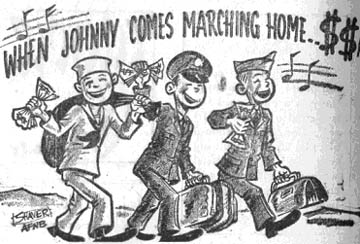 Editorial
Editorial
Financial Fitness
You’ve been taking part in a physical fitness program for some time now and
feel pretty good about it. Right? Then now about taking part in another
program that will make both you and your savings account feel good. Call it the
“financial fitness” program.
Americans are great ones for the use use of cliches. When a serviceman meets
a buddy and asks, “what’s doing?” he may get an answer like “don’t take any
wooden nickels.” An empty answer. But if his pal says something like “save
your money,” he’s giving just about the most friendly advice possible.
Benjamin Franklin once wrote in a letter that “nothing is certain but death
and taxes.” True enough. True enough. But there’s nothing you can be more
certain of than the ten percent interest you receive in the new Overseas Savings
Program which President Johnson put into effect. You don’t have to use a slide
rule or be a mathematician to know that for every dollar you get ten cents more
for every five, it’s 50 cents more, for every ten, its a dollar more, all part
of the “financial fitness” program! While you’re working for your country, make
your dollars work for you. Look into the new Uniformed Services Savings program
and get into the habit of “owing the bank”, every payday.
Or, make it easy on yourself. Have your dollars deducted before you see
them. Each payday, make believe you’re paying on a debt. Sort of “owing the
bank.” That’s the way to become financially fit. (AFNB)
You Better Watch Out
Deadline for Xmas Mail Set
Armed Forces personnel stationed in Vietnam should mail their Christmas gifts
early to facilitate arrival prior to to the holiday.
If they intend to use regular postage rates, senders should mail their gifts
between October 21 and November 10.
If the sender intends to use air mail postage, his gifts should be mailed not
later than December 10.
Parcels addressed to servicemen in Vietnam that weigh no more than five
pounds and measure no more than 60 inches in length and girth combined may be
mailed at the ordinary postage rate and be transported by air on a
space-available basis between San Francisco and Vietnam.
There are no present plans for a special Department of Defense airlift of
bulk collections of Christmas gifts for servicemen in Vietnam this year.
The Post Office Department cautions that:
a. Gifts should be securely packed in cartons of wood, metal or double-faced
corrugated fiber board.
b. Fragile items should be surrounded by cushioning materials such as
excelsior or shredded paper.
c. Matches, lighter fluid, and similar flammable items are prohibited from
the mails.
The Post Office Department and the military postal service do their utmost to
insure delivery to destination in time, but the holiday season brings thousands
of extra packages into the mail system. Despite their best efforts, many
packages do not reach their destination because they are wrapped poorly or
incorrectly or illegibly addressed.
Remember - SHOP EARLY and MAIL EARLY - have your Christmas gifts in the mail
before the mailing deadlines:
Regular postage overseas - November 10. Air Mail- December 10.
| The TROPIC LIGHTNING NEWS is an
authorized publication of the 25th Infantry Division. It is published
weekly for all division units in the Republic of Vietnam by the
Information Office, 25th Infantry Division, APO U.S. Forces 96225. Army
News Features, Army Photo Features and Armed Forces Press Service material
are used. Views and opinions expressed are not necessarily those of the
Department of the Army. Printed in Saigon, Vietnam, by Saigon Daily
News. Maj. Gen. Fred C. Weyand . . . . Commanding General Maj. William C. Shepard . . . . . . Information Officer 1st Lt. William H. Seely III . . . . Officer-in-Charge Sp4 David L. Kleinberg . . . . . . . Editor Sp4 Adrian E. Wecer . . . . . . . . Editorial Assistant |
Page 3 TROPIC LIGHTNING NEWS October 14, 1966
M-79 Has Surprise For Cong
By PFC Dan Desmond
Two innovations in the grenadier’s arsenal are surprising Viet Cong who fight
soldiers of the “Tropic Lightning” Division. One is designed to open their eyes
and the other to close them permanently.
Now carried in supply channels, the rounds can be fired from the 30mm grenade
launcher. They are being issued as linemen are instructed in their use..
The eye-opener is a white, star cluster flare equipped with a parachute which
enables it to light an area for long periods. The new development eliminates
the necessity of carrying a special flare gun.
The eye-closer is a “buckshot round” that makes the M-79 a super shotgun.
Effective for 50 yards, the round contains 20 20-grain lead pellets and is
designed to give the grenadier fire power within 35 yards.
One unit now using the buckshot round is the 1st Bn., 27th Inf.,
“Wolfhounds.”
Sp4 Clarence Bishop, 18, of Charleston, S.C., a member of Co. A, said the
round is good for a wooded area. It’s dangerous to fire the regular round in a
spot like that because it’s more powerful and could injure friendly troops if it
hits a tree.”
PFC John Nesbit, 20, of Pomona, Calif., a member of the reconnaissance
platoon, said the buckshot round was developed to fill the gap between zero and
30 yards.
Sp4 Fred Wade, 20, of Jacksonville Fla., added, “Like a sawed-off shotgun,
the new round allows snap shooting at range with only a momentary glimpse of the
enemy.”
With the new rounds being issued, “Charlie” will find himself bucking for
extra trouble once he makes contact with our soldiers.
|
Reel Riot Over 007
|
Artillery, Air Strikes
V.C. Squad Silenced
Infantrymen of the division’s “Fire Brigade” on Operation “Sunset Beach” had
just arrived at the landing zone.
Then knew the Viet Cong were in the area and were reassured as sniper fire
began popping from the treelines. Co. C, 1st Bn., 27th Inf., “Wolfhounds”
immediately launched a counterattack with small arms and M-60 machine gun fire,
and within minutes after their arrival in the area of operations, two Viet Cong
lay prey to the Wolfhound attack.
Shortly after, the Wolfhounds on the way to their second objective,
encountered heavy resistance from a reinforced squad of VC, 100 yards to their
front.
The VC responded with medium fire, and artillery was called in on one enemy
position manned by a .50 caliber machine gun. The 3rd Bn., 13th Arty., answered
the call for artillery shortly before two F-100 jets from the 3rd Tactical
Fighter Wing at Bien Hoa pounded the enemy position with butterfly bombs and
20mm cannons for ten minutes.
With supporting fire from the 25th Avn. Bn.’s “Little Bear” gunship platoon,
the Wolfhounds assaulted the area and found two more enemy dead.
Hawaii Sends Greetings
Greeting cards hand made by the Class of 1968 of Honokaa High School in
Honokaa, Hawaii, were recently distributed to the men of Co. A, 1st Bn., 35th
Inf.
Co-chairmen Donna Kato and Rachille Nakashima wrote that the cards were made
because “we appreciate the courageous work of the men in Vietnam who are
fighting for freedom, liberty and peace, and we take this means of thanking
them.”
1/35th Lt. Receives Silver Star
1st Lt. Lawrence K. Connor, executive officer of Co. A, 1st Bn., 35th Inf.,
was recently awarded the Silver Star by Brig. Gen. Glenn D. Walker, 3rd Brigade
commander.
Lt. Connor received his country’s third highest award for valorous actions
during the May 29 “Battle of 10 Alpha” where he organized the defenses of the
critical area of his company’s perimeter, rescued comrades and continued to
direct his platoon while seriously wounded.
|
Share This Paper
|
 |
| CLEARED - The dense underbrush is cleared by an armored personnel carrier of the 1st Bn. (Mech). 5th, Inf., during an operation on the Filhol Plantation just north of Cu Chi. |
Thuy, 10, Can Go to School Now
By Sp5 Dave Fisher
A little Vietnamese girl stood on the sidewalk in the middle of the village
of Tay Ninh, 65 miles northwest of Saigon.
Her friends were laughing and talking with some American soldiers in town for
laundry. But this girl didn’t feel like laughing and playing.
Her name is Le Thi Thuy, and her 10 years of life seem too few to be worrying
about what her future will be.
Thuy goes to school two days a week. The rest of the Week she spends trying
to raise enough money for her family to live. Her brother and sister are on the
streets with her - helping.
Thuy thinks bitterly of the Viet Cong because they killed her father while he
was serving with the Vietnamese Army. If he were still alive, she would have
the money to go to school and get a proper education.
This is Thuy’s problem. She wants to attend school because she isn’t getting
the kind of education she needs.
Standing on the sidewalk contemplating her problem, she notices one
particular soldier who is watching her.
What could he possibly want? He walks over to her and notices a cut on her
leg. Nearby is an Army medical truck so he takes her over to it and has a medic
put iodine and a band-aid on her leg.
Sp4 Richard H. MacMaster, 22, of Bayonne, N.J., is the colonel’s driver for
the 2nd Bn., 14th Inf. Specialist MacMaster drives into Tay Ninh every day to
pick up the laundry. He had noticed Thuy for several days. She had stood in
the same place every day for as long as he could remember.
“She isn’t like the other kids,” he said. “She doesn’t come running around
the truck like they do.”
It was this difference from the rest of the Vietnamese children that had
attracted Specialist MacMaster’s attention. He felt that he wanted to learn
more about this child. Through an interpreter he began asking questions.
Thuy told him that she lived in Tay Ninh with her sister and brother and
mother. She told him of her father being killed by the Viet Cong. When asked
why she wasn’t in school, she answered that her mother didn’t have enough money
to send her for more than two days a week.
Specialist MacMaster decided to furnish the money she needed to attend school
for five days a week. They took him home to meet her mother, and since Thuy’s
mother had no objection, Specialist MacMaster gave Thuy enough to attend school
five days a week for a year.
Because of Specialist MacMaster’s generosity, little Le Thi Thuy will now
have a brighter future ahead of her. With the money provided by him, she at
least has a start on the kind of education she so desperately needs.
Page 4 - 5 TROPIC LIGHTNING NEWS October 14, 1966
[This issue of Tropic Lightning News was scanned from a bound
library volume provided by the 25th Infantry Division Museum. One of
the photographs and caption on pages 4 and 5 are missing and one is cut in half.
They were
printed across the center of the 2-page-wide sheet and hidden from sight
because of the way the paper is bound into the book - the book could not be
safely opened wide enough to see that
part of the page.]
VIET CONG TURN TAIL ON 3RD BRIGADE ARMOR
69th, 3/4 Cav. Put on Pressure
By Lt. Peter J. Washer
Tanks and mechanized infantry, churning up dirt in the central highlands for
the Third Brigade Task Force on Operation “Paul Revere,” have kept the North
Vietnamese Army (NVA) on the run.
Both NVA regulars and Viet Cong have been reluctant to fight American forces
except on their own terms, and those terms have not been the 1st Bn., 69th
Armor, and its attached 3rd Sqdn., 4th Cav.
The enemy has stayed away from such firepower. The enemy can hear the roar
of engines and the crunching of the underbrush miles away.
Armor patrols, therefore, have attempted to penetrate deep into enemy
strongholds to force the NVA and VC to fight.
Patrols
Co, A, 2nd Bn., 35th Inf., and the Cav.’s joint operation in September was an
example of how such patrols are executed.
Tanks and armored personnel carriers (APCs) with the infantry riding atop
arrived at the area of operations in the morning. The infantry dismounted,
dispersed and began a thorough search of the area.
The tanks staved behind on high ground in defilade, able to cover the
infantry’s progress and ready to rush ahead if a firefight should break out.
On this patrol no contact with the enemy was made and after three hours the
infantry again mounted the tanks and armored personnel carriers and returned to
base camp to set up a perimeter defense for the night.
Ironic
Armor has proved invaluable in the defense which is somewhat ironic since
tanks were designed primarily as a weapon of offense. In defensive positions
tanks, of course, are silent and, if well concealed are difficult to detect
until fired.
[A paragraph is missing here, lost in the center fold of this page.]
...suffered 200 NVA dead on a quiet battlefield. Neither the 1/69th or the ROKs
suffered a casualty.
Escort
Besides patrols and perimeter defense, tanks and APCs escort all the road
conveys supplying 3rd Brigade forward posts.
Many low-powered mines have been harmlessly detonated beneath the armored
bellies of tanks that would otherwise have blown up a truck, possibly killing
the driver and destroying the cargo.
Tanks and APCs with their mounted machine guns are able to bring considerable
firepower to bear on any location which may fire on a convoy.
With the Cav., the 69th Armor is proving there is a role for armor in
Vietnam, a role it is executing with considerable skill against an elusive
enemy.
|
Photos by Spy Dennis Martens |
] |
BLOCKING - A tank from the 3rd Sqdn., 4th Cav., leaves the road to establish a blocking position atop a hill in support of infantry patrols in the area. |
 |
| MOVE OUT - APCs of C Trp., 3rd Sqdn., 4th Cav., carry elements of Co. A, 1st Bn., 35th Inf., some 20 miles from their battalion command post in a search-and-destroy sweep during Operation “Paul Reverve III.” |
| ON THEIR OWN - Men of Co. A, 2nd. Bn., 35th Inf., and tanks of the 3rd Sqdn., 4th Cav., leave their battalion command post for an operation. |
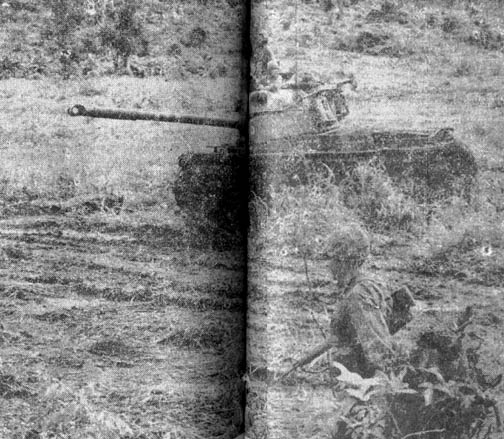 |
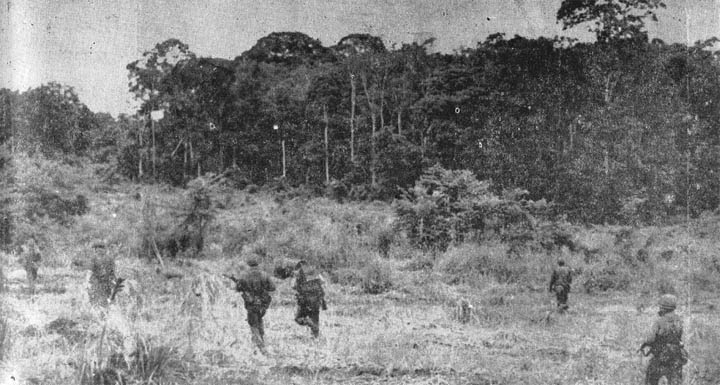 |
| Men of the 35th Infantry “Cacti” fan out to comb potentially treacherous terrain in the central highlands of South Vietnam. |
| APC - An armored personnel carrier (APC) from the 3rd Brigade overrides a barbed wire barricade and booby traps to make way for infantrymen of the 35th Infantry “Cacti” near Pleiku. |
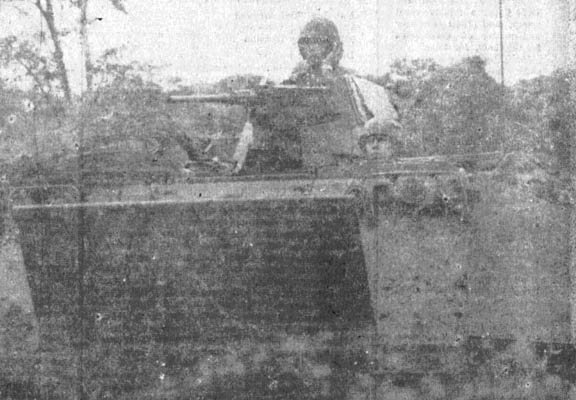 |
Page 6 TROPIC LIGHTNING NEWS October 14, 1966
 |
Specialist Has Big Mail Call
|
Men in Action
Squads Face Off – Accidentally
With rain sliding off their camouflaged steel helmets onto their perspiring
faces, the 11-man squad from Co. A. 2nd Bn., 14th Inf., “Battle Dragons,” left
their field camp and headed for a spot about 75 yards from their perimeter where
they were to set up an ambush.
The Battle Dragons had already seen many signs of Viet Cong activity in the
vicinity that day, including the discovery of a 280-ton cache of rice, so the
squad was quite alert as it worked its way through the brush to the ambush site.
With just a few yards to go PFC Dale Taylor of Edwardsville, Kan., squad
point man, raised his hand and stopped the squad. For 60 long seconds not a
sound was heard except the steady patter of the rain.
Then a restless Viet Cong guerrilla changed his position breaking the
silence.
The Co. C squad automatically dropped to the wet grass and opened up with
M-79 grenade fire and automatic weapons fire. The shocked enemy responded with
about ten poorly aimed grenades before it fled into the jungle.
Ironically enough, the estimated VC squad and the Co. A squad had chosen the
same location for their night’s work. A restless VC and an alert point man
saved the night for the Battle Dragons.
| GUNNER - On the move is a machine gunner of Co., 4th Bn., 9th Inf., “Manchus.” The gunner, with weapon at the ready, moved into a more effective position after being sniped at by Viet Cong during an operation in the Filhol Plantation, just north of the 25th base camp. (Photo by PFC Vern Shibla) |
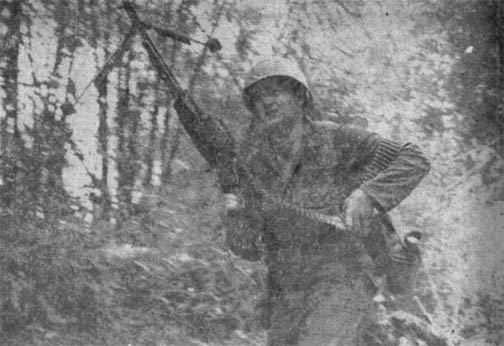 |
Dixie Cups Hot Stuff At Pleiku
The miles of smiles and the sound of hand clapping showed that it was hardly
a routine Friday afternoon at the 3rd Brigade Task Force in Pleiku.
A USO rock’n’roll show had made its way to the “Bronco” brigade at Pleiku.
The show featured the Dixie Cups, a female vocal group, and their manager and
master of ceremonies for the show, Joe Jones.
Jones began the show by singing an “oldie but goodie” that he made popular,
“You Talk Too Much,” followed by several other recording hits.
He brought on the Dixie Cups who, demonstrated a few of the latest dance
styles. Soon after, they sang many of their popular hits including one of their
biggest, “Chapel of Love.”
‘F’ Troop Not Funny to VC
The mention of “F” Troop brings to mind the comical television show of the
same name. The 196th Light Infantry Brigade at Tay Ninh has its own “F” Troop
which is not comical, especially for the Viet Cong; for instead of fun, its
fame is won by firepower.
Troop F, 17th Cav., has three fast-moving reconnaissance platoons armed with
jeep mounted M-60 machine guns and 106mm recoilless rifles. In addition, each
platoon has a mortar and rifle squad - quite a deadly combination, to say the
least.
Wolfhounds Kill 5 Cong
A company of division “Wolfhounds” recently killed five Viet Cong on a
routine sweep a few miles west of the “Tropic Lightning” Division’s Cu Chi base
camp.
Co. A, 1st Bn., 27th Inf., arrived in their landing zone and set up blocking
forces to catch any Viet Cong the company’s main force might chase its way.
After sweeping through to the first objective without making contact, the
Wolfhounds arrived at the second objective where they encountered heavy sniper
fire.
The 1st platoon, acting as reaction force for that objective was called. PFC
Zdzislaw Tellner, 20, of Chicago said the company’s main force was fired at from
two sides when it was called.
“We started toward them fording a river when the major (Maj. Guy S. Meloy,
battalion commander) told us he saw four VC to our front from his command and
control ship. We started after them and immediately came under heavy sniper
fire,” said Pvt. Tellner.
“There were two explosions which I thought were mortars, but the official
reports said they were rifle grenades.”
“We fought out of there, killing two VC on the way and joined the rest of the
company who were in a heavy fire fight. They killed the other three during that
fire fight and then contact was broken,” Tellner related.
1/5th Finds VC Rest Camp
The 1st Bn. (Mech.), 5th Inf., recently discovered a Viet Cong rest camp in
the Boi Loi Woods, 60 miles northwest of Saigon.
The battalion’s Co. B was on a search-and-destroy mission when it received
fire from a recoilless rifle. Returning the fire, it advanced and found the
expired shell and a trail of blood. The men dismounted their armored personnel
carriers and followed the trail.
They came upon two large buildings, heavily fortified with bunkers and punji
pits. The thatched roofs were held up by four heavy wooden beams, and the sides
were open. The floors were covered with logs, and concealing an underground
shelter.
When the men entered the area, rear guard Viet Cong fired upon them, two of
which died in the brief fire fight.
|
Letter From Hawaii
Maj. Gen. Fred Weyand |
Page 7 TROPIC LIGHTNING NEWS October 14, 1966
OCS Offers Key to Leadership And Prestige
Leadership, prestige, self-confidence and higher pay are just some of the
benefits offered to graduates of Army Officer Candidate Schools (OCS).
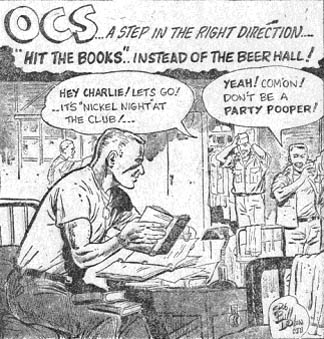 Averaging 23 weeks in length, the Army’s eight OC Schools offer intensified
training to qualified warrant officers and enlisted men who have an earnest
desire to become commissioned officers.
Averaging 23 weeks in length, the Army’s eight OC Schools offer intensified
training to qualified warrant officers and enlisted men who have an earnest
desire to become commissioned officers.
With the current build-up of the Army, OCS has become an increasingly
important source of commissioned leaders. Brig. Gen. George G. O’Conner,
assistant division commander, pointed out that 20,000 newly commissioned
officers will be needed this fiscal year alone. This is an average increase of
3500 each month.
Schools
Graduates of eight schools - infantry, Fort Benning, Ga.; armor, Fort Knox,
Ky.; artillery, Fort Sill, Okla.; signal, Fort Gordon, Ga.; engineer, Fort
Belvoir, Va.; ordinance, Aberdeen Proving Grounds, Md; transportation, Fort
Eustis, Va.; and quartermaster, Fort Lee, Va. - will provide a large portion of
this demand.
“The opportunity of attending OCS is not afforded to everyone,” writes one
senior officer candidate. “Some of you will be unable to meet the physical or
mental requirements.”
The requirements are high, established to screen applicants and accept only
top-calibre potential leaders at OC Schools. Requirements include that
applicants be at least 18 1 /2 years of age but not older than 28 at the time of
enrollment. However, a waiver of this requirement to age 33 can he granted to
individuals who possess unusual skills or technical qualifications.
Score
Also, a minimum score of 110 must be attained on the Army General Technical
Test, a 115 score on the Officer Candidate Test, and 300 on the Physical Combat
Proficiency Test. Besides being at least a high school graduate or equivalent,
two years of high school math is also required far attending either artillery or
Engineering OCS.
Applicants must be a U.S. citizen or intend to become one. In addition, a
National Agency security check must prove favorable.
A satisfactory medical examination is required within six months prior to
enrollment. Minor medical defects can be waivered when they do not interfere
with performance of duties.
At all schools, emphasis is heavy on a basic three-part program: (1)
Academics, which consist of formal classroom instruction followed by practical
field application. (2) Leadership training, where candidates perform as class
and company officers, is carefully observed by tactical officers. (3) Physical
training which builds leaders physically as well as mentally.
Graduation
Benefits of OCS graduation, in addition to those already mentioned, are
numerous. Gene O’Conner explains the benefits to two major groups of service
personnel.
First, the career soldier who was perhaps once discouraged about OCS, stands
a better chance of being accepted today. For him he has the chance to enjoy the
opportunities, responsibilities and pay of an officer throughout the remainder
of his career.
Secondly, it benefits the “one term” soldier who will be seeking employment
after his term of service is completed. His future employer, always in search
of potential company officers and executives, will look more favorably upon a
former commissioned officer. By graduating from OCS, this job applicant has
already proven himself a responsible leader.
Personnel interested in attending OCS should talk with their commanding
officer. He can provide the details. A unit OCS advisor will then assist
applicants in filling out the required forms.
Hot Dogs And Dancing
Div., Viets Celebrate Holiday
The smell of sizzling hot dogs filled the air at Duc Hue District
Headquarters, 30 miles northwest of Saigon, as Vietnamese children scampered
about at their own delight.
Like children everywhere, the Vietnamese boys played their games of soccer,
volleyball and badminton, and the girls played with toy lanterns and helped with
the cooking.
The occasion was “Tet Trung Thu,” the Vietnamese children’s national holiday;
a day in which all is devoted to the happiness of Vietnamese youth.
Capt. Jack Monroe, a 38-year-old Honoluluan of the 1st Bn., 8th Arty., and
Capt. Charles B. Foster of Special Forces Detachment D-35 happily watched the
children as their units teamed up in bringing in the festival’s food and
supplies.
Vietnamese parents joyfully cooked and handed out the food and drinks to the
more than 600 children present for the festivities.
Filling their hands with food and drink, it seemed to most that the children
would soon be suffering from a gigantic stomach ache; but the children fooled
everyone.
Bowing and curtsying, they passed the food to their elders and to the U.S.
troops on the ground. Some of the children who couldn’t carry more than one
drink at a time shared them with “American brothers.”
Tan Phu Trung
At Tan Phu Trung, the children threw a mid--autumn party for 2nd Brigade
officers and the 1st Bn. (Mech), 5th Inf.
The children performed native dances, each telling a story. They sang
Vietnamese songs, and there were speeches thanking the battalion for its aid.
Almost 1500 children attended the party. Refreshments were served to the
guests and more than 100 pounds of candy and two tons of clothes, were
distributed.
35th Helps Montagnard Villagers
When a platoon from the 35th Infantry was recently sent in secure the village
of Plei Gao Geng, it was accompanied by the brigade civic action team.
The platoon encircled Plei Gao Geng and searched the village for weapons,
radios or other signs of enemy activity.
Meanwhile, the civic action team gathered the Montagnard villagers together.
Capt Robert E. Beber conducted sick call, treating 15 villagers, mostly children
with minor ailments.
Helicopters brought soap, blankets, pipes (a luxury to the people) and books,
distributed to the nearly 100 residents as part of the brigade’s “Helping Hand”
program.
Finding nothing suspicious the units left the village content there had been
no recent enemy activity in the area and hoping these people would realize that
the South Vietnamese cause was their cause.
‘Doc’ Collins on Way At Cry of ‘Medic’
Sp5 Raymond “Doc” Collins is a medic attached to Co. C, 1st Bn., (Mech), 5th
Inf. When he hears someone yell, “Medic,” he’s on his way.
For instance, during a recent operation in the Ho Bo Woods, 45 miles
northwest of Saigon, the battalion was hit by mortars.
Co. C was closest to the tactical command post and the mortars landed in
their area extensively. One armored personnel carrier (APC) was hit. It was
Specialist Collins job to render aid, but he was at the company commander’s APC
approximately 150 yards away.
1st Lt Lorenzo Phillips, acting company commander, turned to his track chief
and said, “We need an APC to get ‘Doc’ over to the other track.”
“No we don’t, sir,” said his track chief, “Doc’s’ on his way.”
Lt. Phillips looked out his track and saw Collins running through shin-deep
mud towards the disabled men. When he reached them, the mortars had stopped,
but sniper fire had started. Ignoring the dangers he faced, Specialist Collins
continued to aid the wounded men.
Said Specialist Collins later, “I was just doing my job,” And he was.
Many Marines
Marines in Vietnam number more than 20 percent of Marine Corps 278,000 force
level to be attained by end of his fiscal year, according to Navy Secretary
Nitze in his Las Vegas speech.
 |
| MOBILE MORALE - Morale in the 25th Infantry Division at Cu Chi is high and there are seven reasons why. They are (l to r) American Red Cross Recreation Hostesses Kathleen Lundy, Shiela Otto, Pat MacDaniel, Lynn Schwartz, Mina Carver, Bernadette Smith, and Vicky Olson. (Photo by PFC John Dillman) |
Page 8 TROPIC LIGHTNING NEWS October 14, 1966
19-Year-Old Lt. Tells ‘Battle Dragon’ Story Of Big VC Rice Find
“We were walking slowly through the jungle,” said 2nd Lt. Dale R. Crafton,
19, of Seymour, Ind., “when they opened up on us.”
Lt. Crafton, a platoon leader with Co. B, 2nd Bn., 14th Inf., and already the
winner of the Silver Star, told a story which would someday be in the battalion
history books the day the 2/14th captured 558,000 pounds of VC rice.
The unit was conducting sweeps in notorious Boi Loi Woods, 50 miles northwest
of Saigon, after receiving information from a “Chieu Hoi.”
The Chieu Hoi, an ex-member of a VC supply battalion, had identified the
location of what he said was a major VC supply staging area. The battalion was
called upon to search the area and check out the Chieu Hoi story. Lt. Crafton’s
platoon was assigned as point platoon for that particular sweep.
“We had just begun to come into the area,” said Lt. Crafton, “when we began
to receive small arms fire. It didn’t sound like too much, but we were pinned
down.”
The battalion called in artillery and the snipers were dispersed. As they
moved on into the area, the battalion began coming upon caches of rice, barley
and peanuts.
Continuing to search the area, the battalion located a total of almost 280
tons of grain.
“And there’s more of it all over the place,” said one solider. The rice was
located in caches, protected by small warehouses which were well camouflaged
from both the air and ground.
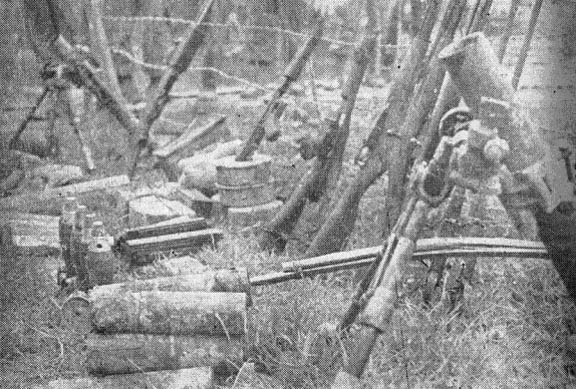 |
| LARGEST - Enemy equipment rests in the possession of Co. C, 4th Bn., 9th Inf. It was the largest VC weapons seizure made by a unit of the 1st Brigade since their arrival in Vietnam. (Photo by PFC Vern Shibla) |
Wolfhounds Kill 15 Cong
A multi-company operation conducted by the 1st Bn., 27th Inf., “Wolfhounds,”
recently killed 15 Viet Cong and captured four seven miles west of the
division’s base camp. The Wolfhounds also captured two weapons during the
action.
The battalion had information on an enemy unit in the area, but didn’t know
just where.
Co. A swept northwest of the battalion’s location when an intelligence report
came into the battalion headquarters pinpointing the enemy position. According
to the report, the enemy mission was to harass helicopters flying over the
vicinity.
Co. A was called back in, and a new plan was devised. At 1:30 in the
afternoon, the 1st and 3rd Platoons walked into the Viet Cong position while the
company headquarters group set up a blocking force for Co. C, which would be
air-lifted in.
The 2nd Plt., Co. A, specially trained in airmobile assaults, was to stand by
at the battalion command post as a reaction force.
With Co. A set up, Co. C flew around the area to make the V.C. think they
would strike a distant location. Then, landing from a different direction, they
trapped the Viet Cong between them and Co. A.
A half hour after Co. C made its surprise landing, 15 Viet Cong were dead and
four were captured.
| TOTE THAT BRIDGE - A bridge section constructed by Co. D, 65th Engr. Bn., is picked up by a CH-47 “Chinook” helicopter and transported to a field location 25 miles away. “Chinooks” of the 179th Aviation Company haul loads too heavy for the light helicopter to carry. |
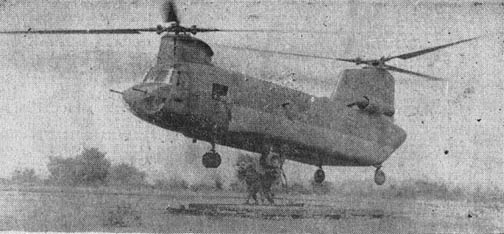 |
Thanks to:
The 25th Infantry Division Museum for providing the volume of 1966 Tropic
Lightning News,
Ron Leonard, 25th Aviation Battalion for finding and mailing them,
Kirk Ramsey, 2nd Bn., 14th Inf. for creating this page.
This page last modified
01-09-2008
©2008 25th Infantry Division Association. All rights reserved